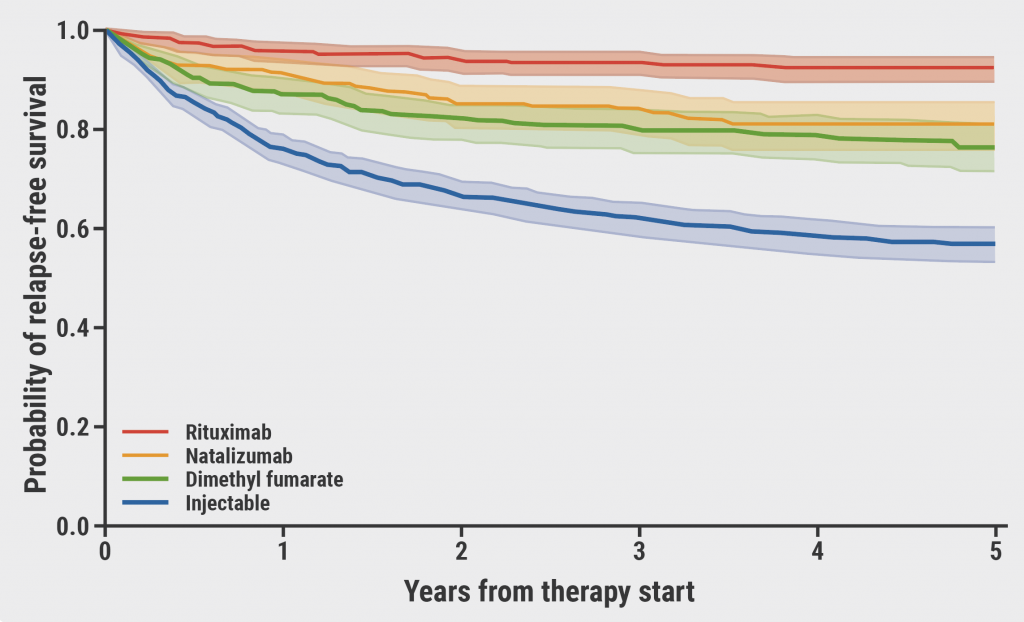Ocrelizumab outperformed placebo in patients with PPMS in the 144-week, double-blind plus extended controlled periods of the randomised, phase 3 ORATORIO trial (NCT01194570). The OLE of this trial assessed the long-term efficacy and safety of ocrelizumab for patients (n=517) maintaining or switching (prior placebo receivers) to ocrelizumab therapy. The primary endpoint of this trial was time to first 48-week CDP on the Expanded Disability Status Scale (EDSS) of ≥1 point (in patients with EDSS ≤5.5 at baseline), or ≥0.5 points (in patients with EDSS >5.5 at baseline). Prof. Jerry S. Wolinsky (University of Texas Health Science Center at Houston, TX, USA) presented the 8-year follow-up study results.
At week 408, initial ocrelizumab users displayed fewer 48-week CDP-EDSS events (55.9%) than delayed treatment receivers (67.5%). Combining all periods of the study, the reduced risk of CDP-EDSS events was 29% for patients receiving ocrelizumab from the start. The risk of repeated 48-week CDP-EDSS events was lower in ocrelizumab receivers as well: the mean cumulative number of repeated CDP-EDSS was 0.944 in early ocrelizumab users versus 1.207 in delayed ocrelizumab users. Over 8 years, the risk of achieving 48-week CDP-EDSS score of ≥7, representing wheelchair dependence, was numerically lower (33%) in subjects receiving ocrelizumab at the start.
In summary, compared with a delayed ocrelizumab start, early treatment significantly reduced patients’ risk of CDP-EDSS. Early ocrelizumab receivers’ need for walking aid was reduced by approximately a third as well. In short, a 2-year delay in initiating ocrelizumab “comes at a cost to patients,” suggesting a clear benefit for clinicians to start this therapy from the get-go.
- Wolinsky JS, et al. Sustained reduction in 48-week confirmed disability progression in patients with PPMS treated with ocrelizumab in the ORATORIO OLE: 8-year follow-up. OP158, ECTRIMS 2021 Virtual Congress, 13–15 October.
Copyright ©2021 Medicom Medical Publishers
Posted on
Previous Article
« Eculizumab, satralizumab, or inebilizumab for NMOSD? Next Article
Cortical lesions predict disease progression and disability accumulation »
« Eculizumab, satralizumab, or inebilizumab for NMOSD? Next Article
Cortical lesions predict disease progression and disability accumulation »
Table of Contents: ECTRIMS 2021
Featured articles
Preliminary data shows positive results of ATA188 for progressive MS
COVID-19
MS patients at risk of hampered immune response after vaccination
Immunotherapy in MS does not influence COVID-19 severity and mortality
Anti-CD20 antibodies associated with worse COVID-19 outcomes
ECTRIMS-EAN consensus on vaccination in MS patients
Experimental Treatments
The role of astrocyte phenotypes in acute MS lesions
Promising results of intrathecal MSC-NTF cells in progressive MS
Preliminary data shows positive results of ATA188 for progressive MS
Evobrutinib reduces relapses and MRI lesion activity
Primary endpoint of opicinumab for relapsing MS not met in AFFINITY trial
Elezanumab did not outperform placebo in progressive and relapsing MS
Ibudilast reduced retinal atrophy in primary progressive MS
Treatment Trials and Strategies
ECTRIMS/EAN Clinical Guidelines on MS treatment: an update
Rituximab most effective initial MS therapy in Swedish real-world study
Ublituximab meets primary endpoint for relapsing MS
Dynamic scoring system aids decision to switch MS therapies early
Long-term suppression of MRI disease activity with ocrelizumab
Stopping DMT: when or if at all?
Biomarkers
Early predictors of disability progression in paediatric-onset MS
High-sensitive biomarker detection in MS via novel ELISA assay
Cortical lesions predict cognitive impairment 20 years after MS diagnosis
Applicability of sNfL measurement in clinical practice
MRI more sensitive for disease activity than relapses in SPMS
Imaging
Changes in GABA-receptor binding among cognitively impaired MS patients
T2 lesions independently predict early conversion to SPMS
Natural killer-like CD8+ T cells as a reservoir of clonal cells related to MS activity
Neuromyelitis Optica Spectrum Disorder (NMOSD)
Eculizumab, satralizumab, or inebilizumab for NMOSD?
Long-term efficacy of satralizumab for NMOSD
Long-term efficacy data: inebilizumab for NMOSD
Progressive MS
Charcot Award 2021: Progressive MS, a personal perspective
Top score poster: Meta-analysis on the effect of DMTs
Cortical lesions predict disease progression and disability accumulation
Ocrelizumab shows long-term benefits in primary progressive MS
Other
WNT9B-gene variant associated with doubled relapse risk in MS
Melatonin associated with improved sleep quality in MS patients
“Expanded Disability Status Scale 0 is not normal”
Personality trait alterations in MS patients
Related Articles
November 25, 2020
Functional potential of gut microbiome in paediatric MS
November 8, 2019
Transplantation of autologous mesenchymal stem cells

© 2024 Medicom Medical Publishers. All rights reserved. Terms and Conditions | Privacy Policy
HEAD OFFICE
Laarderhoogtweg 25
1101 EB Amsterdam
The Netherlands
T: +31 85 4012 560
E: publishers@medicom-publishers.com

